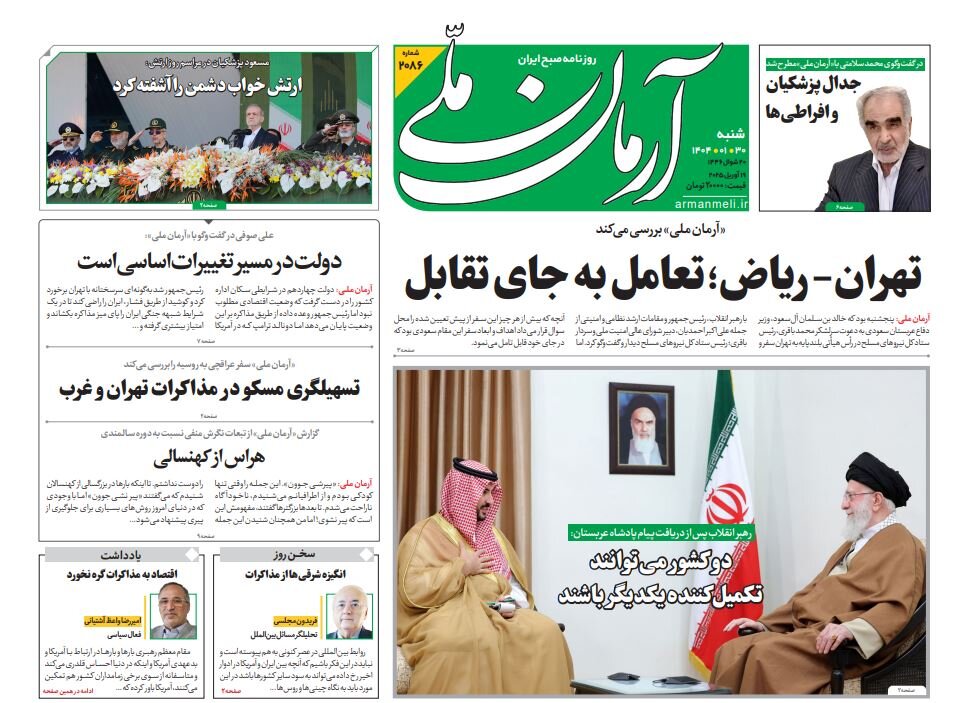TEHRAN – Arman Emiri investigated Saudi Defense Minister Khalid bin Salman Al Saud’s trip to Tehran, and it was the goals and dimensions of the visit of this Saudi official.
This is a situation where visits to our country by senior Saudi officials are becoming rare. Travel at this level and meetings with senior Iranian officials illustrate important issues. Khalid bin Salman, brother of Saudi Crown Prince Mohammed bin Salman, appears to have not only discussed regional issues to strengthen peace and stability. The fact that the Saudi Arabian king had conveyed his message to the leaders of the revolution also showed that he had left Riyadh for Tehran for reasons beyond the troubles at hand. It is certainly true that Khalid bin Salman’s trip to Tehran focused primarily on bilateral relations. In any case, Saudi Arabia observes regional and international circumstances and potentially addresses local issues through these relationships, seeking close ties with Tehran in various fields.
Kayhan: Multilateral diplomacy is Iran’s meaningful message to Washington
In his analysis, Kayhan discussed Iran’s multilateral diplomacy in its foreign policy, saying: When the US and the West were no longer able to play an uncontroversial hegemonic role in the world, Iran harnessed its regional and global capabilities to take the path of “multilateral dipramasy” with strength and decision. This shows that neither Washington nor Western diplomatic smiles will determine the future of the country’s foreign policy. The revolutionary leader also said that the issues of the state should not be tied to these consultations and that the mistakes made at the JCPOA should not be repeated. Now, the Foreign Ministry, led by Seyed Abbas Araghchi, has chosen a new pathway where negotiations to lift sanctions continue through indirect diplomacy, but alongside other tools of global engagement, not as “all.” In fact, the country’s diplomacy is simultaneously pursuing lifting sanctions and actively pursuing a path to neutralize them.
Hamshahri: Will Iran and Trump turn tensions into agreement?
Hamshari discussed the second round of speech in Rome and the possible agreement between Iran and the United States. It writes: The second round between Iran and the United States was held in Rome under different conditions than the first round. Iran proposed a three-stage plan that includes limiting uranium enrichment, increasing access to IAEA inspectors and suspending several nuclear activities in exchange for lifting sanctions. The most likely scenario is a limited agreement that Iran will halt 60% enrichment and the US will suspend some of its sanctions. Such an agreement will allow Trump to assert victory and give Iran the opportunity to alleviate economic pressure, but mistrust threatens its sustainability. The Roman talks could lead to a temporary agreement that both sides emphasize as victory. But behind the scenes, Israel may be preparing for a limited strike in secret coordination with the United States. Iran is also trying to ease the pressure by proposing a three-stage plan with Russia. The outcome will be revealed either by the expiration of Resolution 2231: a vulnerable agreement or a new tension.
Shargh: The shadow diplomacy of mistrust
In commentary, Sharg dealt with challenging negotiations between Iran and the United States. It writes: The change in the place of negotiations does not convey a specific message within the ambiguous and complex atmosphere of these negotiations, but details can also be viewed as important indications. According to Araghchi, changes in the tone and position of the American team indicate a lack of severity in some of the US in these negotiations, increasing distrust. On this side of the table, Iran continues to stick to its position in negotiations, but what can be seen from Tehran’s tone and position shows a continuation of serious distrust in Washington’s intentions and actions. In the current situation, trusting diplomatic teams and following the path adopted by the system of control is essential. Now all eyes are in Rome. Diplomacy is ongoing amid doubts, contradictory messages and desire to resolve lingering issues. However, the continuation of this pass depends on whether the parties are willing to overcome the gap or whether they want to once again fade into the shadow of mistrust.

